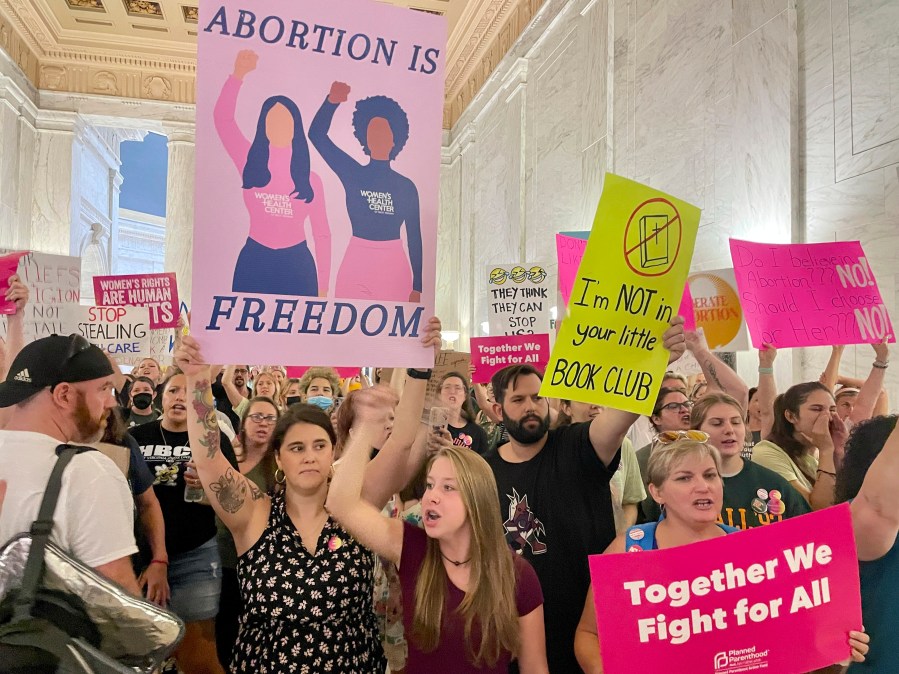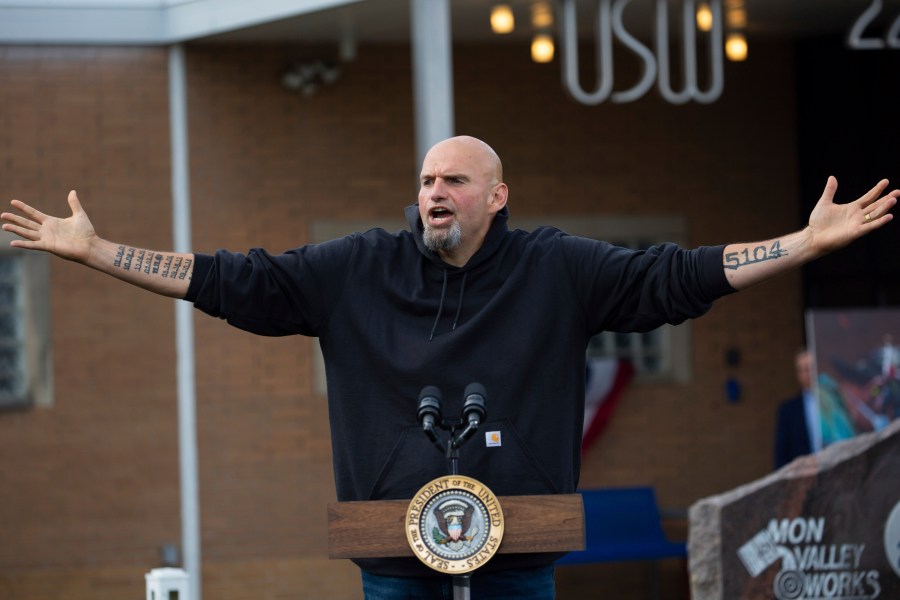5 things we learned from the 2022 primary season

This year’s primary season has provided a number of clues about what to expect going into November’s midterm elections, as well as the 2024 presidential election.
The primaries proved that former President Trump has maintained a firm grip on the Republican Party since leaving office in 2021, while abortion has been a powerful force for galvanizing Democrats and potentially some swing voters. Meanwhile, Americans remain at odds with one another in terms of what direction to take the country after more than two years of a pandemic and its economic fallout.
Here are five things we learned from the 2022 primaries.
Abortion is a potential game changer

Abortion rights protesters chant outside of the West Virginia Senate chambers prior to a vote on an abortion bill in Charleston, W.Va. (AP Photo/John Raby)
While there was skepticism surrounding how salient of an issue abortion would be on the campaign trail following the Supreme Court’s decision to overturn Roe v. Wade, the primary season showed the extent to which the issue could boost Democrats come November.
The party pointed to voters in Kansas, a conservative-leaning state, last month overwhelmingly rejecting an anti-abortion ballot initiative that would have allowed for potential statewide abortion restrictions. Additionally, they cited Rep. Pat Ryan (D-N.Y.), who made abortion a centerpiece of his campaign in the special election for New York’s 19th Congressional District and won.
“They underestimated the ability for voters to be independent thinkers and not necessarily subscribe to a party label when it comes to issues that impact their everyday lives,” said Democratic strategist Antjuan Seawright, referring to Republicans.
Polls show that abortion is certainly an important issue for voters but will likely not top economic concerns. A Politico-Harvard poll released last week found that 44 percent of voters said abortion was “extremely important,” while 51 percent said the same about inflation and 49 percent said the same about the economy and jobs.
“I think it’s a small help to them,” said Republican strategist Keith Naughton, when asked about whether abortion will be a strong issue for Democrats going into the midterms. “I think it’s still going to be the economy.”
“In individual races where you can highlight a lot of specific issues, something like abortion can take center stage,” he continued. “But when you go to the broad, national race, it’s diluted pretty significantly. But it’s still a benefit for the Democrats.”
Trump’s hold on the GOP hasn’t loosened

Former President Donald Trump speaks at a rally in Wilkes-Barre, Pa. (AP Photo/Mary Altaffer)
Trump was arguably a big winner coming out of the primaries, with a number of endorsed candidates emerging from their intraparty contests victoriously.
In the Senate, a number of Trump-endorsed Republican candidates, including J.D. Vance in Ohio, Herschel Walker in Georgia, Adam Laxalt in Nevada and Blake Masters in Arizona, won their respective primaries.
The former president was also successful in backing primary challengers to take out House Republicans who voted to impeach him, most notably Rep. Liz Cheney (R-Wyo.). In fact, only two House Republicans, Rep. Dan Newhouse (Wash.) and David Valadao (Calif.), survived their Trump-backed primary challengers.
Meanwhile, in many races further down the ballot, including for secretary of state, Trump-backed candidates who have questioned the 2020 presidential election results won. One of the most notable examples of this is Arizona GOP secretary of state nominee Mark Finchem.
“He’s still the dominant personality,” Naughton, who is also an opinion contributor for The Hill, said of the former president.
Yet some Republican candidates who were endorsed by Trump in their primaries have since backed away from the former president. Masters, for instance, scrubbed language from his campaign website asserting that if the 2020 presidential election had been “free and fair,” Trump would still be in the White House.
“Between his legal troubles and his poll ratings, I think you see even these people that he endorsed and he pushed through are kind of backing away from him and they’re trying to run on their own,” Naughton said.
Gerrymandering, retirements tipped scales in House GOP’s favor

House Republican Conference Chair Rep. Elise Stefanik, R-N.Y., accompanied by House Minority Whip Steve Scalise, R-La., right, speaks at a news conference on Capitol Hill. (AP Photo/Andrew Harnik)
While Democrats remain optimistic about their chances in the Senate, Republicans are still favored to win back the majority in the House. This dynamic can be attributed to the redrawing of House districts, as well as House Democrats retiring in droves.
In Maryland and New York, courts axed Democratic maps that would have given the party some cover during what is expected to be a tough year for them. Meanwhile, in states with Republican-controlled legislatures like Texas and Florida, redrawn House districts further boosted the GOP.
House Democrats appeared to predict early on that it would be a brutal year for the party given that, historically, a first-term president’s party typically loses seats in the midterms. A total of 49 lawmakers in the House, 31 Democrats and 18 Republicans, chose not to seek reelection. That number does not include lawmakers who departed office before their term was up. The dynamic allowed Republicans to go on the offense in the seats that opened up.
“If they don’t get the majority, it would a stunner. It would be a colossal failure on their part,” Naughton said of Republicans.
Left, center both claimed wins in Democratic primaries

Pa. Lt. Gov. and senatorial candidate John Fetterman speaks to a crowd gathered at aa United Steel Workers of America Labor Day event with President Joe Biden in West Mifflin, Pa., just outside Pittsburgh. (AP Photo/Rebecca Droke)
On the Democratic side of the aisle, the party’s moderate and progressive flanks both claimed victories in the primaries.
While progressive hopefuls like Jessica Cisneros, who challenged incumbent Rep. Henry Cuellar (D-Texas), proved to be unsuccessful, others like Jamie McLeod-Skinner were victorious. McLeod-Skinner defeated incumbent Rep. Kurt Schrader in the primary for Oregon’s 5th Congressional District. Meanwhile, in the Senate field, progressives like Pennsylvania Lt. Gov. John Fetterman and Wisconsin Lt. Gov. Mandela Barnes advanced to their general elections.
Overall, though, the party’s establishment and moderate flanks racked up the most victories. Reps. Marie Newman (Ill.) and Andy Levin (Mich.), some of the most progressive members of the House, lost their primaries, while moderate Democratic attorney Dan Goldman won his primary in New York’s 10th Congressional District. Additionally, Democratic Congressional Campaign Committee Chairman Sean Patrick Maloney handily defeated his progressive primary challenger, state Sen. Alessandra Biaggi, in New York’s 17th District.
Democrats argue that the fractious nature of the primaries won’t necessarily hurt the party going into November, pointing to Biden’s recent achievements, including the Inflation Reduction Act and student loan debt forgiveness.
“With the president’s agenda and the work that Democrats have done from a legislative standpoint, I think that all the various labels within our party have something to be happy and excited about,” Seawright, the Democratic strategist, said. “I think that has helped heal any ills that may have previously existed about where this party is going. I think we’re more unified than we have been in a long time.”
The country remains bitterly divided

President Joe Biden speaks outside Independence Hall in Philadelphia. (AP Photo/Matt Slocum)
The primaries did demonstrate that roughly two years after a contentious presidential election that resulted in an attack on the Capitol, the country is still divided ahead of the midterms.
“The country is no more divided than it was before Joe Biden became president,” Seawright said. “What I do know is that there’s one party that’s working like hell to bring this country together and the other party is doing everything they can to use their rhetoric, their way of governing as a weapon of mass political destruction and distraction.”
The rhetoric seen from the respective heads of both parties appears to have heated up in recent weeks.
Earlier this month at Independence Hall in Philadelphia, Biden warned that Trump and “MAGA Republicans” who back his views and the “Make America Great Again” agenda pose a grave threat to the country’s democratic values. Meanwhile, at a separate speech in Pennsylvania, Trump referred to Biden as an “enemy of the state” and called for his supporters “to smash the grip of this vile and vindictive political class.”
And it remains unclear how the November general elections will shape up, roughly two months out from Election Day.
“To this point, I don’t think there’s been one thing that anyone could point to that could say this is the reason why this election could go one way or another,” Seawright said.
Copyright 2023 Nexstar Media Inc. All rights reserved. This material may not be published, broadcast, rewritten, or redistributed. Regular the hill posts







